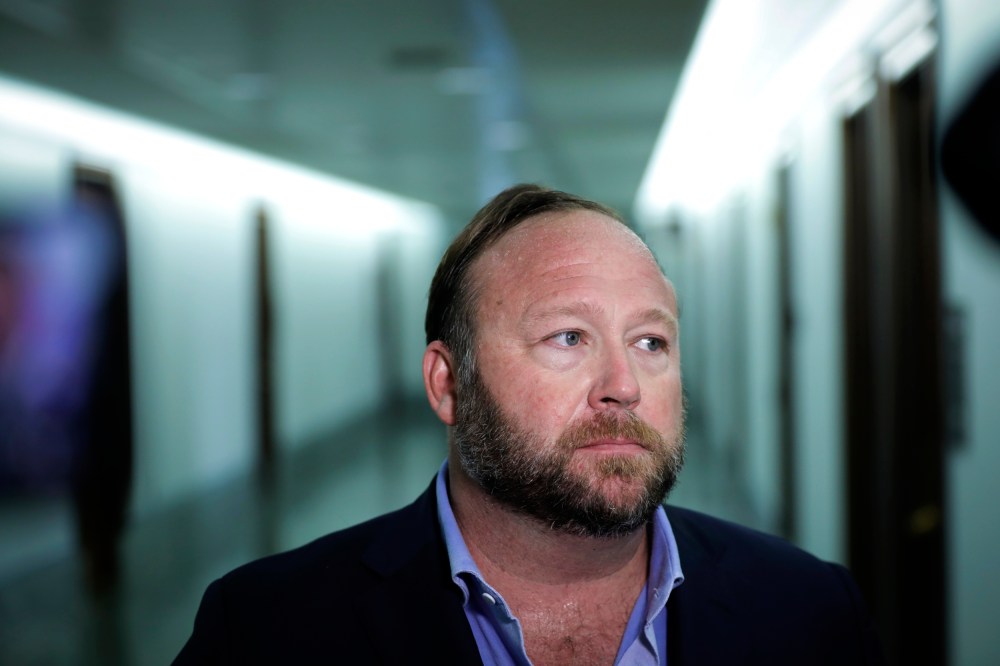On Monday, the Supreme Court refused to hear a case brought by radio host and conspiracy theorist Alex Jones, in which Jones claimed his First Amendment rights were being violated.
If you’ve ever wondered where our First Amendment protection ends, you’ve found it.
The move came after Jones was sanctioned for statements he made on air against a lawyer in a defamation suit brought against Jones by parents of victims of the Sandy Hook Elementary School mass shooting. In his eyes, the sanction violated his First Amendment right to free speech.
If you’ve ever wondered where our First Amendment protection ends, you’ve found it.
But the bigger question is not necessarily what to do with the Joneses of the world. (We’ll get into why the speech Jones is being sued for and sanctioned over is undeserving of First Amendment protection in a minute.) The truly important question is what to do with speech that is a closer call, like disinformation regarding politicians, political issues and scientific facts.

The Jones case does not bring up those issues, but we can only avoid them for so long. Remember when, more than a year ago, before more than a half-million Americans died from Covid-19, former President Donald Trump claimed the coronavirus is “something we have tremendous control of”? Or when he claimed he won the 2020 election that, in fact, he lost? So do I.
The First Amendment does protect, with some limited exceptions, your ability to say truly horrendous and despicable things without fear that the government will silence that speech. If you want to grab a microphone in the middle of the town square and start spouting irrational and harmful conspiracy theories — go for it; the government likely can’t stop you.
The First Amendment does protect, with some limited exceptions, your ability to say truly horrendous and despicable things without fear that the government will silence that speech.
This is typically true even if you, a despicable speaker, are a member of the government or even the head of government. The government allows harmful, hateful and repugnant speech in many cases namely because in our country we are generally more worried about government censorship than we are about spurious, disgusting and degrading speech.
We basically adhere to the idea that in an invisible marketplace of ideas, the more speech the better. The hope is that the productive, truthful speech will rise to the top while the hateful, lie-laden speech will fall to the bottom and be disregarded. We strongly adhere to a theory that under the First Amendment, each individual has the ability to express themselves free of government intrusion — even if that expression is abhorrent.

But there are exceptions where contemptible and hateful speech is not allowed, such as in the case of Jones. After Jones took to the air to claim the 2012 mass shooting at Sandy Hook Elementary School was a “staged” hoax, parents of the slain children were subjected to threats and harassment. Some of those parents sued Jones in a defamation suit.
After Jones went on a verbal rampage against one of the lawyers while the defamation case was pending, the judge sanctioned Jones. Jones protested, claiming the sanctions violated his First Amendment rights. The Connecticut Supreme Court unanimously ruled against Jones, finding the sanctions were appropriate because his speech amounted to impermissible threats. Jones appealed to the U.S. Supreme Court, which led to Monday’s refusal to hear the case, letting Jones’ defeat in the Connecticut courts stand.
When Jones claimed the judge’s sanctions violated his First Amendment rights, a unanimous Connecticut Supreme Court disagreed.
Jones’ case brings up two of exceptions to the First Amendment: We do allow people to be punished for speech when that speech is defamatory or poses an imminent threat of physical harm — both of which happened when Jones made claims on air that the Sandy Hook shootings, in which 26 people died, 20 of whom were children, were staged and that family members were paid actors.













